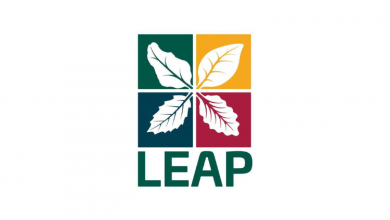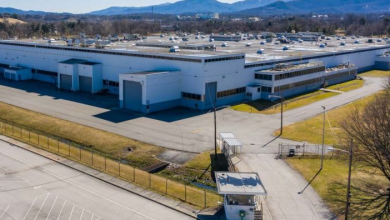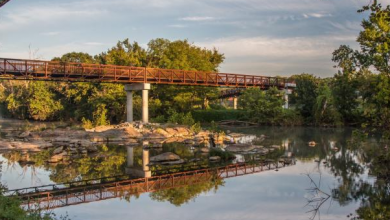Mountain Valley Pipeline could benefit from agreement secured by W.Va. U.S. Sen. Joe Manchin
U.S. Sen. Joe Manchin of West Virginia has reached an agreement with Democratic leaders that could ease the regulatory and legal logjams that have long afflicted the Mountain Valley Pipeline.
As part of a concession won during negotiations over a federal climate and tax bill, Manchin struck a deal with Senate Majority Leader Chuck Schumer, House Speaker Nancy Pelosi and President Joe Biden.
The agreement would ensure that federal agencies “take all necessary actions to permit the construction and operation” of Mountain Valley, according to a summary released Tuesday by Manchin’s office.
Manchin is a champion of Mountain Valley, a 303-mile natural gas pipeline that begins in his home state. He is also a swing Democratic vote, which enabled him to use the pipeline as leverage for his support of an Inflation Reduction Act that is a top White House priority.
Under the proposed agreement, any future legal challenges would be decided by the U.S. Court of Appeals for the District of Columbia — not the 4th U.S. Circuit Court of Appeals, which has repeatedly struck down permits for the pipeline on environmental grounds.
That could be vital for Mountain Valley, according to Height Capital Markets, an investment banking firm that has closely followed the project.
“We see the primary challenge to MVP as the courts rather than federal permitting authorities, which have been generally in support of the project,” Height said in a written commentary Tuesday.
“As such we believe it would be difficult to accelerate the permit revisions, which are already underway,” Height said. “However, moving any future legal challenges to the D.C. Circuit could reduce the risk of additional delays from the 4th Circuit, which many view as hostile.”
Developers of Mountain Valley, which passes through Southwest Virginia on its path from northern West Virginia to connect with another pipeline near the North Carolina line, had originally planned to complete the $6.6 billion project by the end of 2018.
But the 4th Circuit has repeatedly struck down permits issued by the federal government, including approvals for the 42-inch diameter buried pipe to cross streams and pass through the Jefferson National Forest.
Opponents say muddy runoff from construction sites has already caused environmental problems, which will only worsen if the pipeline is completed and begins to transport natural gas that will contribute to climate change.
Manchin’s efforts would further diminish government oversight that is already lacking, they contend.
“The delays that MVP has experienced were caused by federal agencies that failed to do the jobs they are obligated to do,” Wild Virginia, one of the environmental groups that brought the legal challenges, said in a statement from conservation director David Sligh.
“The company and many of those agency officials know that the pipeline can’t be built while meeting the current laws … That’s why they tried to cut corners,” Sligh said.
Meanwhile, the lead partner in the joint pipeline venture praised Manchin’s “steadfast” efforts to streamline the energy permitting process at a time when the war in Ukraine and other geopolitical tensions have increased the need for natural gas.
“I think this is a very important piece of legislation that both sides of the aisle have been supporting,” Thomas Karam, chairman and CEO of Equitrans Midstream Corp., said Tuesday in a conference call to discuss second quarter earnings with financial analysts.
Mountain Valley hopes to complete construction by the second half of next year, Karam said.
The most recent legal setbacks came earlier this year, when the 4th Circuit threw out a permit for the pipeline to pass through 3.5 miles of national forest land in Giles and Montgomery counties. A second ruling from the court invalidated an opinion from the U.S. Fish and Wildlife Service, which found that endangered species — including the Roanoke logperch and the candy darter — would not be jeopardized by building a pipeline through their habitats.
It was the second time the court rejected the permits; Mountain Valley is currently applying a third time for reissued approvals.
However, the 4th Circuit’s decisions made it clear that the pipeline would not be completed by an Oct. 13 deadline set by the Federal Energy Regulatory Commission.
In June, Mountain Valley asked FERC to extend its approval of the pipeline — which was based on the finding that there was a public need for the gas it would transport — for another four years. A public comment session on the request ended last week.
Twenty-seven Virginia legislators, 270 organizations and thousands of individuals opposed the extension, according to Appalachian Voices, which has joined Wild Virginia and other opponents in a sustained legal fight against the Pittsburgh-based company.
“There is overwhelming health, ecological, climate, and economic evidence that the MVP has no place in our communities, especially during a climate crisis,” said Grace Tuttle of the Protect Our Water, Heritage, Rights coalition.
Others counter that the pipeline is crucial to the country’s energy supplies and will aid economic development in the regions it passes through.
Written comments in support came from major energy suppliers, trade associations, chambers of commerce and Roanoke Gas Co., which says it plans to use gas from the pipeline to serve a growing customer base that includes Franklin County, which currently lacks service.
Gov. Glenn Youngkin also backed the pipeline.
“Virginia has made all the necessary investments to utilize natural gas as a bridge fuel to reach a no-carbon electricity supply goal by 2045,” Youngkin wrote, “but challenges are posed by global availability of raw materials, product manufacture capacity, workforce capacity, and grid infrastructure deficiencies, among other issues.”
“Consequently, I do not believe it is in the best interest of Virginians to condemn this project in the spirit of reducing carbon emissions” when in fact it helps to do just that, the governor’s letter stated.
Completion of Mountain Valley consisted of just a single sentence in a page-long summary of Manchin’s proposed changes to the national energy permitting process, which was released by his office but has yet to pass Congress.
Other goals include setting maximum timelines for permitting reviews, changing parts of the Clean Water Act to include improvements from both the Biden and Donald Trump administrations, and measures to address what the document called “excessive litigation delays.”
One of the listed items was a requirement for the random selection of appellate court judges who hear challenges of project approvals by government agencies.
The same three-judge panel of the 4th Circuit has presided over most, but not all, of the decisions that went against Mountain Valley. The court has a random selection process, but also says its policy allows the same three judges to consider subsequent challenges involving the same case.
In a highly unusual step, Mountain Valley asked the 4th Circuit to randomly choose a three-judge panel that will hear a pending case involving water crossing permits. The court denied the motion without comment in June.
“If even half of the measures outlined in Manchin’s proposal are passed, it would constitute a major overhaul of fossil fuel infrastructure permitting,” said Ridge Graham, North Carolina field coordinator for Appalachian Voices.
While completion of Mountain Valley alone is unacceptable, he said, the broader package “would be a disaster for clean air, clean water and front line communities.”




